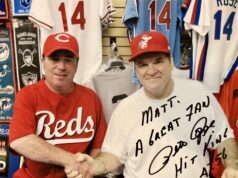Ace June 22, 2000
Fenton Johnson says he actually likes to be asked why he writes – as he was recently, while serving on a panel for the anniversary of Harper’s in New York. He thinks it’s a good question to contemplate regularly, and it helps him answer the one before him today -as to why he’s coming back to Kentucky to participate in a reading that will benefit the Kentucky Fairness Alliance (a non-profit organization that promotes civil rights for the gay, lesbian, bisexual, and transgendered population).
His response is all tied up in why he became a writer in the first place. “There’s a greater order in the world, and our responsibility – each of us – is to find [how] we fit in and support that order. That’s why I particularly write. And a part of that is using writing as a tool for social justice.”
He feels that accomplishing that, “while also telling a good story” are “interrelated and necessary” goals for us to “reach each other.”
Given that Kentucky recently had one of the most virulent anti-gay legislative sessions in history, complete with attempts to roll back ordinances and laws which promoted equality, a good conversation about social justice might be in order.
Johnson, a native of New Haven, Kentucky, is no stranger to the gospel of tolerance. A seeker, his current book in progress is, Beyond Belief: a Skeptic Searches for an American Faith, chronicling his exploration of Buddhism and Christianity (specifically Catholicism, and a study of the nearby Abbey of Gethsemani).
But somewhat surprisingly, the author and activist seems almost encouraged, gratified even by the current climate of conservatism.
He says, “What we’re seeing now is a kind of backlash. If this were not happening, I would feel concerned. I wouldn’t feel like we were having any impact.”
As for the religious fractiousness of the debate, he admits, “There’s no doubt that in many of the institutionalized churches, gays and lesbians are used as a lightning rod. But [this issue] centers around who has power, and who feels threatened by the likelihood they might have to share power.”
Which naturally evolves into a discussion of politics. He sees the anti-gay and lesbian backlash as a “smokescreen.”
As such, it serves two purposes. It “consumes energy.” And, “it’s a safe issue among constituents. [Politicians] can [take a stand against] gays and lesbians” without fear of reprisal, and they “can avoid talking about serious issues, like economic opportunity, education… [Anti-gay rhetoric] wins brownie points with the constituents. And it sounds as if you’re doing something up there in Frankfort. It’s an old story in politics. Demagoguery is used as a smokescreen to confuse and divert [the citizens] from issues of great significance like class and economics.”
Johnson is especially impressed with KFA’s outreach efforts to gays and lesbians in rural communities, noting that the majority of Kentucky’s populace lives in small towns. Having lived in San Francisco and New York, he’s often been frustrated by the assumption among urbanites “that everyone lives an urban life,” when “there are gay and lesbian people in every walk of life and in every community.”
He says, “the easy thing is for me to come from outside and stand in front of a large audience of good people… the hard thing is [for] the person who lives in a small town and lets their partner come over and park his car in the driveway in broad daylight and greets them at the door. That’s where the real courage lies… in the daily gesture.”
He recalls an interview he conducted with Wendell Berry, many years ago, when he asked the famous activist if he was advocating that a poor, single, black mother living in Oakland must have an organic garden in her backyard.
He paraphrases Berry’s response to him at the time, “I’m not saying everyone should live like I do, only that people who are capable of making responsible decisions should do so.”
Johnson concurs with the sentiment, adding that people should always act “within the capacity that has been given to you. Don’t shrink from it.” And then, he advocates, “Push it a little further.”
Fenton Johnson is the author of two novels, Crossing the River, and Scissors, Paper, Rock, as well as the non-fiction, Geography of the Heart: A Memoir (a chronicle of his partner’s death of AIDS in 1990). He lives in Tucson, and is currently at work on Beyond Belief: A Skeptic Searches for an American Faith.
A benefit for the Kentucky Fairness Alliance will be at Memorial Hall, June 25, 2000 at 7 pm. Tickets are $10. Authors Fenton Johnson and Barbara Kingsolver will read. Poet Nikky Finney will also participate.
Fairness: A Modest Proposition for Kentucky
Kentucky Fairness Alliance is a non-profit, grassroots educational organization. KFA’s mission is to educate Kentuckians about human rights issues with an emphasis on concerns relating to sexual orientation, transgender, and AIDS/HIV. Maria Price, KFA’s outgoing former Director, recently won a $25,000 national Stonewall Award for her years of advocacy for gay, lesbian, bisexual, transgendered, and HIV+ Kentuckians. (Claudia Knott is KFA’s new Director.)
Founded in 1993, the Lexington-based Bluegrass Chapter of KFA serves sixteen central Kentucky counties.
Bluegrass Fairness operates locally completely through volunteer workers.
Bluegrass Fairness was also a supporter of the 1999 non-discrimination ordinance covering sexual orientation and gender identity.
KFA and its chapters received the National Gay and Lesbian Task Force’s 1999 Creating Change Award for most improving the lives of gay, lesbian, bisexual, and transgendered Americans.







